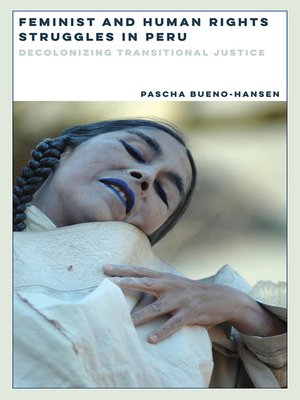Feminist and Human Rights Struggles in Peru
ebook ∣ Decolonizing Transitional Justice · Dissident Feminisms
By Pascha Bueno-Hansen

Sign up to save your library
With an OverDrive account, you can save your favorite libraries for at-a-glance information about availability. Find out more about OverDrive accounts.
Find this title in Libby, the library reading app by OverDrive.



Search for a digital library with this title
Title found at these libraries:
| Library Name | Distance |
|---|---|
| Loading... |
In 2001, following a generation of armed conflict and authoritarian rule, the Peruvian state created a Truth and Reconciliation Committee (TRC). Pascha Bueno-Hansen places the TRC, feminist and human rights movements, and related non-governmental organizations within an international and historical context to expose the difficulties in addressing gender-based violence. Her innovative theoretical and methodological framework based on decolonial feminism and a critical engagement with intersectionality facilitates an in-depth examination of the Peruvian transitional justice process based on field studies and archival research. Bueno-Hansen uncovers the colonial mappings and linear temporality underlying transitional justice efforts and illustrates why transitional justice mechanisms must reckon with the societal roots of atrocities, if they are to result in true and lasting social transformation. Original and bold, Feminist and Human Rights Struggles in Peru elucidates the tension between the promise of transitional justice and persistent inequality and impunity.|
Cover
Title
Copyright
Contents
Acknowledgements
Introduction: Waiting in the Garden of Broken Trees
1. Parallel Tracks and Fraught Encounters: The Human Rights and Feminist Movements (and Campesina Protagonism) in Peru
2. Gender Implementation in the Peruvian Truth and Reconciliation Commission
3. National Reconciliation through Public Hearings: Representative Repertoire, Choreography, and Politics of Reception
4. Sexual Violence beyond Consent and Coercion
5. Finding Each Other's Hearts: Weaving Interculturality into Gender and Human Rights
Conclusion: Paradox and Temporality
Notes
Bibliography
Index
|
"Cutting-edge and original. Bueno-Hansen reveals the meaning behind the rhetoric of human rights promotion in the aftermath of conflict. Using an approach that articulates gender, ethnicity, and coloniality, she illuminates the impact of human rights-based justice processes on marginalized peoples' lives."—Elisabeth Jay Friedman, author of Unfinished Transitions: Women and the Gendered Development of Democracy in Venezuela, 1936-1996
"This book provides remarkable insights into the overlap and disjunctions between the human rights movement's response to atrocities involving women, the response of the feminist movement, and the needs of the women who have been harmed. It is an important and nuanced contribution to the literature on the gendered realities of post-conflict societies. Set in Peru, nonetheless it speaks to a universal experience of conflict and its aftermath."—Fionnuala Ní Aoláin, co-editor of Guantánamo and Beyond: Exceptional Courts and Military Commissions in Comparative Perspective
"In this interdisciplinary and theoretically innovative book, Pascha Bueno-Hansen makes important contributions not only to scholarship on gender and the Peruvian Truth and Reconciliation Commission, but also to broader debates in the fields of transitional justice and in gender and women's studies by explicitly demonstrating the importance of an intersectional analysis for a full understanding of post-war contexts." —Christina Ewig, author of Second-Wave Neoliberalism: Gender, Race, and Health Sector Reform in Peru
|Pascha Bueno-Hansen is an assistant professor of women and gender studies and is affiliated with the Political Science and International Relations Department and the Latin American Studies Program at the University of Delaware.
"This book provides remarkable insights into the overlap and disjunctions between the human rights movement's response to atrocities involving women, the response of the feminist movement, and the needs of the women who have been harmed. It is an important and nuanced contribution to the literature on the gendered realities of post-conflict societies. Set in Peru, nonetheless it speaks to a universal experience of conflict and its aftermath."—Fionnuala Ní Aoláin, co-editor of Guantánamo and Beyond: Exceptional Courts and Military Commissions in Comparative Perspective
"In this interdisciplinary and theoretically innovative book, Pascha Bueno-Hansen makes important contributions not only to scholarship on gender and the Peruvian Truth and Reconciliation Commission, but also to broader debates in the fields of transitional justice and in gender and women's studies by explicitly demonstrating the importance of an intersectional analysis for a full understanding of post-war contexts." —Christina Ewig, author of Second-Wave Neoliberalism: Gender, Race, and Health Sector Reform in Peru
|Pascha Bueno-Hansen is an assistant professor of women and gender studies and is affiliated with the Political Science and International Relations Department and the Latin American Studies Program at the University of Delaware.







